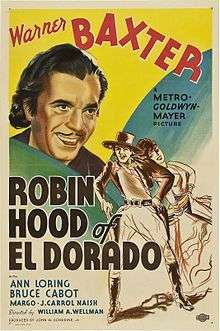Robin Hood of El Dorado (film)
The Robin Hood of El Dorado is a western film directed by William A. Wellman for MGM in 1936. The film stars Warner Baxter as real life Mexican folk hero Joaquin Murrieta and Ann Loring as his love interest, with Bruce Cabot as Bill Warren. J. Carrol Naish portrays Murrietta's notorious partner, "Three-Fingered Jack". The movie portrays Joaquin Murrietta as the Robin Hood of Old California in 1850, a kind, gentle man who was driven to violence. Wellman made it a hard-hitting story about racial prejudice and violence by both sides—Murrietta and his Mexican band and the white settlers.
| Robin Hood of El Dorado | |
|---|---|
 | |
| Directed by | William A. Wellman |
| Produced by | John W. Considine, Jr. |
| Written by | Walter Noble Burns |
| Screenplay by | William A. Wellman Joseph Calleia Melvin Levy |
| Based on | "The Robin Hood of El Dorado" |
| Starring | Warner Baxter Ann Loring Bruce Cabot |
| Music by | Herbert Stothart |
| Cinematography | Chester A. Lyons |
| Edited by | Robert Kern |
| Distributed by | Metro-Goldwyn-Mayer |
Release date | March 17, 1936 |
Running time | 85 min. |
| Country | United States |
| Language | English |
Plot summary
In 1848 in California, a Mexican farmer, Joaquin Murietta (Warner Baxter), has turned criminal to avenge the rape and murder of his wife, Rosita (Margo) and lynching of his brother Jose (Carlos de Valdez), at the hands of the Americans.
Cast
- Warner Baxter as Joaquin Murrietta
- Ann Loring as Juanita de la Cuesta
- Bruce Cabot as Bill Warren
- Margo as Rosita
- J. Carrol Naish as Three-Fingered Jack
- Soledad Jiménez as Madre Murrietta
- Carlos de Valdez as Jose Murrietta
- Eric Linden as Johnnie Warren
- Edgar Kennedy as Sheriff Judd
- Charles Trowbridge as Ramon de la Cuesta
- Harvey Stevens as Captain Osborne
- Ralph Remley as Judge Perkins
- George Regas as Tomas
- Harry Woods as Pete
- Francis McDonald as Pedro the Spy
- Kay Hughes as Louise
- Paul Hurst as Wilson
- Boothe Howard as Tablard
Notes
The screenplay was written by the actor Joseph Calleia, Melvin Levy and Wellman, with assistance from Robert Carson, whom MGM had assigned as his writing partner. In 1937 Wellman and Carson won an Academy Award for Best Screenplay for A Star Is Born. The Robin Hood of El Dorado was based on the biography of Murrietta by Walter Noble Burns and was MGM's attempt as a follow up to Viva Villa!. The film's working title was "I AM JOAQUIN!"
Film historian Frank T. Thompson writes that "Wellman made a stronger statement on the subject of racism than a whole spate of later films (like Gentleman's Agreement)."[1]
The Robin Hood of El Dorado also anticipates the revisionist westerns of the 1960s, especially The Wild Bunch (1969), directed by Sam Peckinpah. Both films mix violence and sentimentality with an undercurrent of regret for a vanishing way of life. Specifically, the Mexican folk song, La Golondrina, is used to similar effect—as a farewell to the outlaw band and as a prelude to extremely violent climaxes.
Art director David Townsend was killed in a car accident while scouting locations for the film.[2]
Crew
- David Townsend - Art Director
- Dolly Tree - Costume Designer
References
- William A. Wellman by Frank T. Thompson, The Scarecrow Press, Inc., 1983.
- Los Angeles Times, August 6, 1935, "Crash Kills Film Expert, David Townsend, Art Aide, Dead and Three Injured as Car Falls in Canyon" pg. A2
External links
| Wikimedia Commons has media related to Robin Hood of El Dorado (film). |